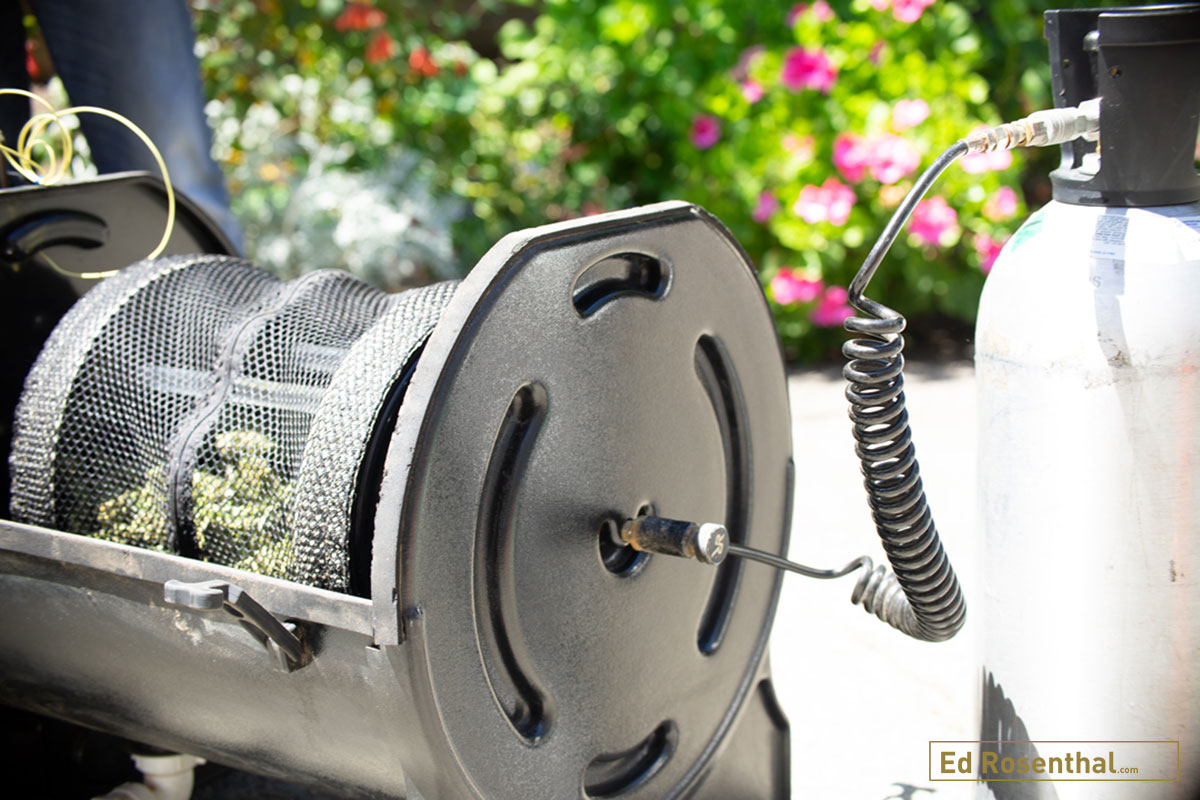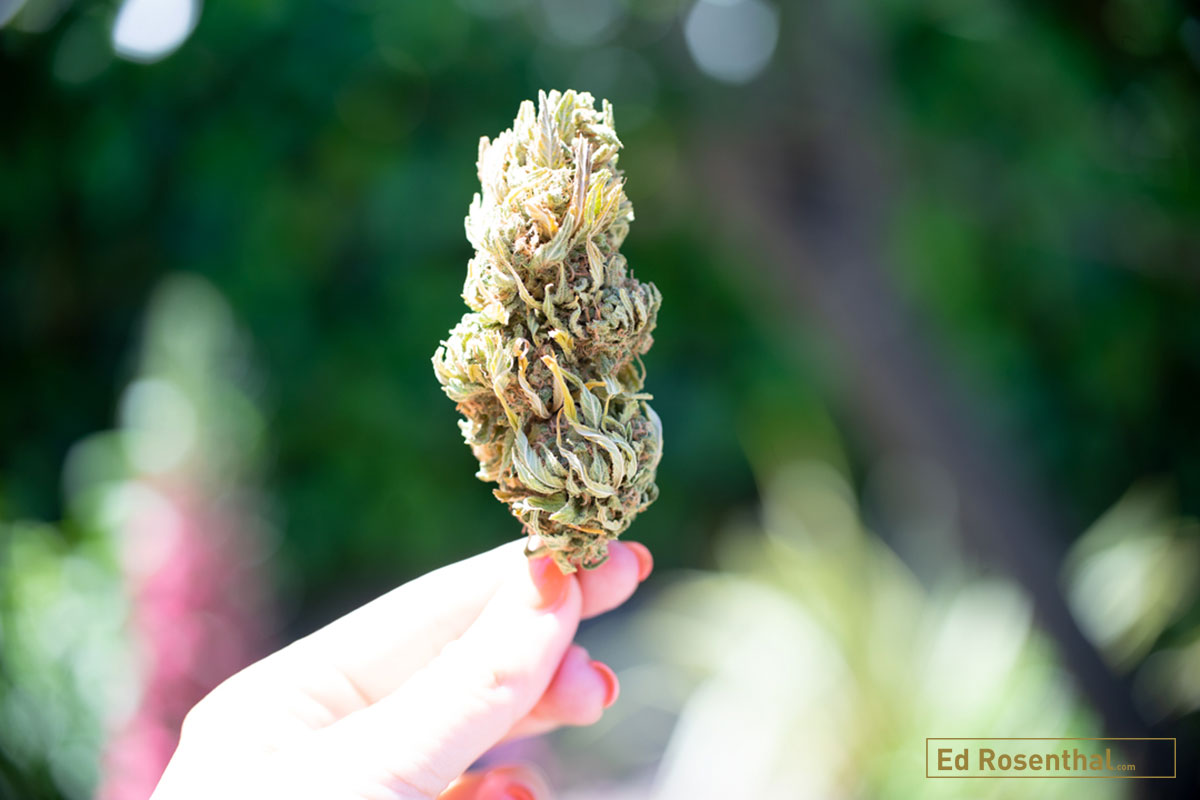The Original Resinator
The Original Resinator was established in 2011. Home of the only multi-use, wet/dry, flash freeze, all-in-one, patented, rotary separation apparatus on the market. Whether it’s distillates, rosin, bho, tinctures, oils, salves, topical's, edibles, or concentrates, it’s always preferred to have a pure extract. All Original Resinator photos taken by Lizzy Fritz for Ed Rosenthal.com.
The Original Resinator
Beyond Buds Next Generation, company Spotlight Sponsor
Like so many cannabis related technologies, the origins of the Resinator was a labor of love. The prototype machine was built in 2008 by Travis Arnovick and James Watts. This original bucket-based contraption was held together by duct tape, bungee cords, silk screen and paper clips. After they strapped on the engine -- an old BBQ rotisserie motor -- it was ready to roll. This magnificent beast went through a long series of trials and test runs until the first market-ready Resinator was built in 2011.
Before their Resinator endeavor, the company founders used to spend long days and nights trying to maximize the amount of resin they could extract from trim and shake, and quickly came to the conclusion that there had to be a better way.
“We would go about collecting the resin glands through a variety of old school traditional methods, but these procedures were too labor intensive and time consuming,” says Arnovick. “So we thought that there had to be a better way, and wanted to take the manual element out of the equation and make the process mostly mechanical. So we set out to create a solution to this problem.”
Today’s Resinator is a multi-use, wet/dry, flash freeze, all-in-one, patented, rotary separation apparatus. The machine uses a dry sieve tumble method -- aided by CO2, dry ice and water -- to extract the essence of botanical resin glands from wet or dried flowers and plant clippings.
The company’s uniquely crafted Resin Collection Bags and removable/washable drum screens sift undesired plant material, stems and particulates, leaving only the desired trichomes to fall through the high quality, micron rated monofilament screens. The combination of these methods and ingredients significantly increases yields and efficiency compared to other sifting techniques.
Some of the design features that set the Resinator apart from the competition include its removable/replaceable and washable screens that come in eight different sizes, depending on the type of extraction or separation that is desired. Another important aspect of the design is the use of liquid CO2, which allows producers to work with live plant material and extract live resin from uncured biomass. This method of extraction is popular with a variety of rosin techniques, including closed Loop systems, short path/fractional distillations and ice wax extractions. The liquid CO2 allows the machine to instantly freeze, fracture and extract resin glands and trichomes from cured and uncured plant material, achieving 20% (or better) returns in less than 10 minutes.
Manufacturers of tinctures, oils, salves, topicals, edibles, and concentrates always prefer pure extracts, and the Resinator delivers high-quality resin all day long. The Resinator can also be employed as a wet/dry flower trimmer, using a mesh screen and CO2 to accomplish up to 80% of the job.
“We spent countless hours in the field with R&D and went through so many concepts, mold changes, screen designs, and motors,” said Arnovick. “Success and failures alike, we stayed diligent in our pursuit of perfection until we finally found the winning combination. We weren’t NASA scientists, just a couple of dreamers with passion to bring our ideas to reality.”
How to Use The Original Resinator XL Model
The Original Resonator extract only the pure essence of botanical female Resin glands from dried flowers and plant clippings. Sift undesired plant material, stems and particulates leaving only the desired trichomes. Escape from the world of residue left over from solvent extractions.
Weigh and measure your materials in preparation for a wet or dry trim
Empty material directly into center chamber of the Resinator and zip up the mesh bag
Install the CO2 coil and make sure the have the temperature diode located somewhere in the chamber
Turn the Resinator on to a low speed and inject liquid CO2 for 20 to 40 seconds
It needs to tumble for about a minute per pound of material
Add ice and water directly to the chamber and let it tumble for about 20 minutes
Take your three bags and put them in a bucket, attach the hose to the Resinator
Let the water drain from the chamber into the bucket
Plug the hose-hole again and repeat the ice and water steps for a second run, let it run for another 15-20 minutes
Shake the rest of the water from the bags into the bucket and empty the bags of material onto a tray and let it dry
ARE YOU INTERESTED IN EXPLORING THE WORLD OF MARIJUANA BEYOND THE BUD?
“The world of cannabis concentrates is expanding . . . if you have any interest in exploring this new frontier, we’ve got a reading recommendation for you [Beyond Buds] treads where no book has tread before.” –Leafly







![“The world of cannabis concentrates is expanding . . . if you have any interest in exploring this new frontier, we’ve got a reading recommendation for you [Beyond Buds] treads where no book has tread before.” –Leafly](https://images.squarespace-cdn.com/content/v1/5b15b6b825bf0270b8b4f22a/1538572835904-SHV370FBNOQO0DTE1RTP/Beyond-Buds_Website.jpg)